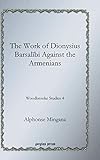The Work of Dionysius Barsalībi Against the Armenians : Woodbrooke Studies 4 / Alphonse Mingana.
Material type: TextPublisher: Piscataway, NJ : Gorgias Press, [2009]Copyright date: ©2009Description: 1 online resource (119 p.)Content type:
TextPublisher: Piscataway, NJ : Gorgias Press, [2009]Copyright date: ©2009Description: 1 online resource (119 p.)Content type: - 9781593338299
- 9781463214241
- online - DeGruyter
| Item type | Current library | Call number | URL | Status | Notes | Barcode | |
|---|---|---|---|---|---|---|---|
 eBook
eBook
|
Biblioteca "Angelicum" Pont. Univ. S.Tommaso d'Aquino Nuvola online | online - DeGruyter (Browse shelf(Opens below)) | Online access | Not for loan (Accesso limitato) | Accesso per gli utenti autorizzati / Access for authorized users | (dgr)9781463214241 |
Frontmatter -- INTRODUCTORY NOTE -- CONTENTS -- BARṢALĪBI'S WORK AGAINST THE ARMENIANS -- Prefatory Note -- Translation -- Facsimiles of Mingana Syr. 347
restricted access online access with authorization star
http://purl.org/coar/access_right/c_16ec
The Work of Dionysius Barsalībi Against the Armenians represents the nature of some disputes in the Christianity of the Middle Ages. Dionysius Barsalībi (d. 1171) in a very rare manuscript, begins by giving a brief sketch of the political and religious history of the Armenians. Dionysius argues that Christ’s body was corruptible up until the time of his death, and only after that did it become incorruptible. This underscores the fact that Christ had a true human body and that he digested food just like other people. The implications for this interpretation in connection with the Eucharist are obviously essential aspects to be resolved in this controversy.
Mode of access: Internet via World Wide Web.
In Multiple languages.
Description based on online resource; title from PDF title page (publisher's Web site, viewed 01. Dez 2022)


